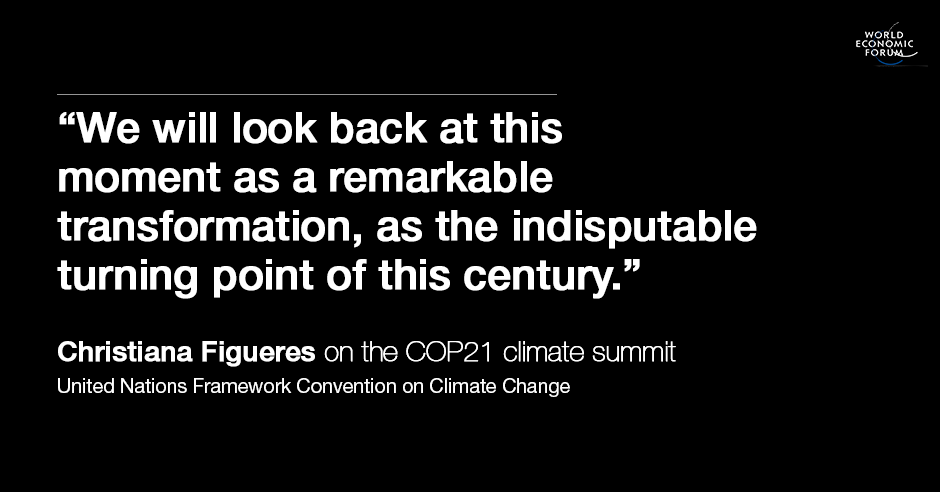Why the world is ready to act on climate change

Stay up to date:
Future of the Environment
Change is created by turning points. Whether through evolution or revolution, turning points in history have changed the way we think, move, communicate, live.
We are at a turning point now. A decisive hour when a historical event occurs, when a decision must be made, when we have understood that the consequences of the past need us to intentionally and decisively redefine the future.
The latest session of the climate change negotiations took place recently, and while I work in this process to support the governments of the world to adopt a legally-binding climate agreement, we should remember that international negotiations don’t cause change, they mark it. The change has already been happening in the “real economy” through a series of mutually reinforcing and increasingly powerful drivers:
- Science has warned that fossil fuels cannot all be burnt if we are to avoid catastrophic climate change. This is changing how investors and shareholders think about risk and whether they are exposed to values that will become stranded. The divestment movement has grown to $2.6 trillion as capital shifts towards lower risk opportunities.
- The insurance industry is waking up to the un-insurability of uncontrolled climate change, leading to stark warnings, notably by Mark Carney, Chair of the Financial Stability Board, that disclosure of risk and risk management has to increase quickly.
- Demand for fossil fuels may be waning. Health impacts from coal are of increasing concern, especially in China but increasingly in India. Glencore, one of the world’s largest coal producers, has lost 87% of market valuation since flotation in 2011. Arctic drilling contracts are being cancelled.
- The destabilizing impact of climate change is complicating and worsening national and international security problems, as unpredictable weather events and reduced access to water and energy lead to unrest and even conflict. With indications that climate change is igniting conflict in the Middle East and elsewhere, the catalytic effect of unaddressed climate change is becoming ever more clear.
- The moral imperative to act is growing. Major faith groups are openly and strongly supporting holistic, equitable, but above all, ambitious climate action. Pope Francis’ Encyclical and the Islamic Declaration on Climate Change are just two of the many calls for stewardship of the global common good.
- Technology is opening new horizons. Costs of installed solar in the U.S have dropped from $77/watt in 1977 to $0.60/watt today. On the back of this, renewable energy has boomed. In 2013 for the first time, more renewable energy capacity was installed than fossil fuel power plants (143 Gw to 141Gw). The estimates made by the International Energy Agency in 2000 for the amount of solar that would be deployed in 2015 was underestimated by more than 18 times, and the renewables industry is just getting started.
The net result is a world ready for change.
Political will has arrived: the 196 countries in the UN negotiations are committed to achieving an ambitious global climate agreement. There is remarkable leadership from many countries, best seen through the 156 national climate plans put forward by nations covering more than 86% of emissions. This is the beginning of a blueprint for our future.
Over the next eight weeks, until the conclusion of the Paris climate summit, I will be writing a series of blog posts in which I will explore the ways in which the world has reached the critical turning points that are finally enabling us to come together to manage the systemic threat of climate change and create a future that is made brighter by the economic, moral and political choices we are collectively now deciding to take.
We will look back at this as a moment of remarkable transformation, as the indisputable turning point of this century. Let us open our eyes now and see it as it happens.
Author: Christiana Figueres, Executive Secretary, United Nations Framework Convention on Climate Change (UNFCCC), Bonn
Image: Adelie penguins stand atop ice near the French station at Dumont d’Urville in East Antarctica January 22, 2010. REUTERS/Pauline Askin
Don't miss any update on this topic
Create a free account and access your personalized content collection with our latest publications and analyses.
License and Republishing
World Economic Forum articles may be republished in accordance with the Creative Commons Attribution-NonCommercial-NoDerivatives 4.0 International Public License, and in accordance with our Terms of Use.
The views expressed in this article are those of the author alone and not the World Economic Forum.
Forum Stories newsletter
Bringing you weekly curated insights and analysis on the global issues that matter.
More on Energy TransitionSee all
Vijay Sankaran
April 22, 2025
Philippe Valahu
April 21, 2025
Dany Qian
April 15, 2025
Charlotte Edmond
April 14, 2025





